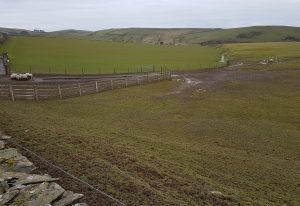South Cumbria Rivers Trust have teamed up with United Utilities to scope, identify and address diffuse pollution issues within the Poaka, Duddon and Levers Water Catchments.
Diffuse pollution occurs when nutrients, pesticides, chemicals, faecal bacteria and sediments are lost from the land into local becks and rivers. It often occurs from a range of sources but the effect is cumulative. Small amounts of runoff from one field, when combined with other sources of pollution, all add up to have a large overall effect on water quality.
Some examples of diffuse pollution:

-
Fertilisers and pesticides spread at the wrong time or too close to watercourse or wetland
-
Cultivating too close to a watercourse. This can remove the buffer strip and increase the risk of soil loss or field runoff straight into a watercourse
-
Erosion and poaching. Soil loss around watercourses or regular traffic through rivers and becks from stock/cattle can further increase erosion risk
-
Applying too much slurry or spreading too close to a watercourse, risks creating pollution runoff effecting the water quality and loss of nutrients.
Resolution of water quality and habitat issues will involve partnership work with key stake holders and government bodies. This will involve action on the ground to deliver interventions which will have a positive effect on water quality; the bread and butter of Rivers Trust work. These interventions will also benefit the United Utilities Drinking Water Supply Process and improve aquatic habitats for wildlife.
Our project officer Hannah Teagle is lead officer for the project, with Mike West, our Projects and Technical Manager supporting the project.
Project objectives:
-
To provide advice to farmers and other land managers to encourage the uptake of interventions and other solutions that protect and improve raw water quality and the water environment.
-
To develop new schemes and interventions appropriate to the pollutants of concern.
-
To identify, scope and promote potential interventions and solutions to the Steering Group
-
To monitor, update and input risks into United Utilities Drinking Water Safety Plans (DWSP) and deliver relevant DWSP and Water Industry National Environment Programme actions.
-
To carry out investigations, field trials, monitoring, sampling and analysis to support, validate and report and present on catchment activities and incidents.
-
To form great collaborations with key partners and to liaise with and work alongside local initiatives including the Catchment Based Approach Catchment Partnership, the Duddon Valley Partnership and the Coniston & Crake Catchment Partnership
Water quality is at the forefront of what we do and improvements at a local level really do make a difference. More information to follow as interventions get underway. You can find out more information about water quality here.



